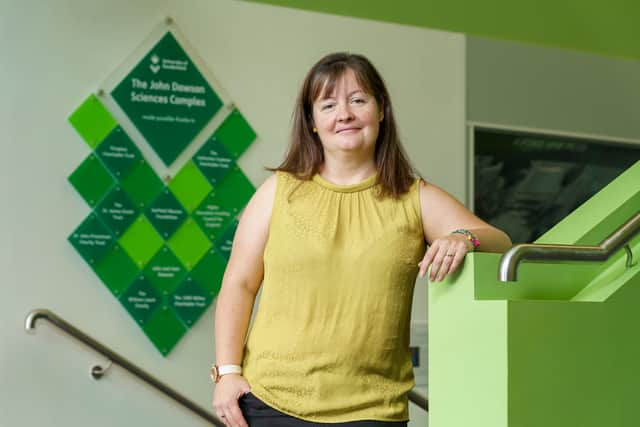Meet the University of Sunderland lecturer helping to solve the 'perfect storm' of the cancer nurses shortage
and live on Freeview channel 276
Nurse and senior lecturer at the city's university, Fiona Holdsworth, is doing her bit to help fill the gap of the dwindling number of specialist cancer care nurses by playing a pivotal role in the design of a national education programme to provide specialist training to fill the healthcare void.
With many specialist cancer care nurses leaving the profession as they approach retirement and an increasing number of patients being diagnosed with cancer, the NHS is facing a shortfall in qualified nurses to provide suitable specialist care.
Advertisement
Hide AdAdvertisement
Hide AdCancer nurse and lecturer on the University of Sunderland’s Registered Degree Nurse Apprenticeship, Fiona, has described the situation as “the perfect storm”.


The situation has been compounded by “limited cancer training” on current nursing courses and not all students being able to get a placement in a hospital cancer setting.
The Aspirant Cancer Career and Education Development (ACCEND) course is aiming to avert this potential crisis by providing a focused education programme for undergraduates training to become nurses right through to nurses already holding specialist positions.
Fiona has played a key role in developing the programme’s content and curriculum.
Advertisement
Hide AdAdvertisement
Hide AdShe said: “The current cancer workforce isn’t resilient. We’ve got lots of people who are approaching retirement, but we are not recruiting fast enough to the profession.
“Due to the complexity of the work we now do, cancer research and progress in treatment, keeping our workforce up to speed on the science and progress is also a challenge.
“Finally, if we take into consideration the impact of Covid on the NHS, and opportunities for training, we cannot release our staff to be trained in this area because of the ongoing pressures on the workforce.
“It’s a perfect storm of unavailability, a lack of resilience, a lack of training and the pace of change.”
Advertisement
Hide AdAdvertisement
Hide AdThe ACCEND programme has been created in partnership with Health Education England, Macmillan, UKONS (UK Oncology Nursing Society) and a number of Higher Education Institutions, including the University of Sunderland.
The aim is to create “learning resources for all clinicians with cancer knowledge from novice to expert”.
Fiona added: “It’s great to be able to combine my skills and experience in cancer care and education to support clinicians who want to learn how to care for individuals with cancer and their families, both for the benefit of the service but also with the hope that others will see what a brilliant, varied and challenging nursing vocation cancer care is.
“I'm grateful to the University for allowing me to commit to this work and proud to represent the institution on this national stage."
Advertisement
Hide AdAdvertisement
Hide AdThe programme offers training in diagnostics, treatment management in areas such as surgery to radiotherapy and pharmacological therapies.
The course also incorporates the need to understand the impact of the disease on the individual patient and their holistic care.
Professor Laura Stroud, Pro Vice-Chancellor and Dean of Health Sciences and Wellbeing, said: “The Faculty is extremely fortunate in having such a dedicated nurse in the Academy. Her commitment and vocation is a shining example to our students and we are proud to work with her.
“It is a privilege to have the opportunity to develop and influence national programmes such as ACCEND that will inspire the next generation to embark on rewarding careers in nursing and healthcare.”
It’s estimated that by 2030, one in two of us will experience cancer.
More information on the ACCEND programme can be found on the NHS website.
Comment Guidelines
National World encourages reader discussion on our stories. User feedback, insights and back-and-forth exchanges add a rich layer of context to reporting. Please review our Community Guidelines before commenting.